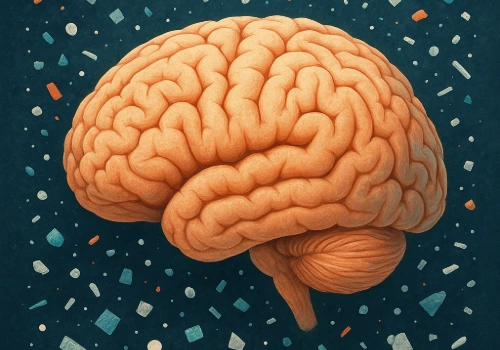
A groundbreaking study published in Nature Medicine recently found microplastic particles in human brain tissue for the first time. The finding has sparked worldwide concern about whether everyday plastic exposure could be harming brain health or even contributing to neurodegenerative diseases such as dementia and Alzheimer’s.
While the research is still new, experts agree that microplastics may play a role in brain inflammation and cognitive decline.
What Are Microplastics?
Microplastics are tiny fragments of plastic less than 5 millimeters in size. They come from:
- Plastic packaging and waste that break down over time
- Synthetic fibers in clothing and textiles
- Personal care products like exfoliants and toothpaste
- Plastic bottles, containers, and utensils used daily
These particles are everywhere—in our air, food, and water—and can enter the body through inhalation or ingestion.
How Microplastics Might Affect the Brain
Scientists have discovered that microplastics can cross the blood–brain barrier, a natural filter that protects the brain from harmful substances. Once inside, they may:
- Trigger inflammation in brain tissue
- Cause oxidative stress, damaging brain cells
- Interfere with normal cell communication, potentially impacting memory and cognition
These biological reactions are the same mechanisms seen in many forms of dementia and neurodegeneration, including Alzheimer’s disease.
Do Microplastics Cause Dementia?
At this stage, there’s no direct proof that microplastics cause dementia. However, studies suggest they can worsen risk factors—especially chronic inflammation and oxidative damage—that contribute to brain aging.
In short:
Microplastics might not cause dementia, but they may make the brain more vulnerable to conditions that do.
Researchers are calling for larger, long-term studies to determine how much exposure is considered harmful and whether reducing microplastics can improve brain health outcomes.
How to Reduce Microplastic Exposure
While it’s impossible to avoid all microplastics, you can significantly reduce your exposure by making small changes:
- Use filtered water instead of bottled water.
- Avoid heating food in plastic containers.
- Switch to glass or stainless steel for storage.
- Choose natural fabrics (like cotton or linen) over synthetics.
- Ventilate your home to reduce airborne microplastic dust.
- Limit processed or packaged foods.
BASS Medical Group: Protecting Brain Health
At BASS Medical Group, our neurologists and internal medicine specialists work together to evaluate and treat memory problems, brain fog, and early signs of cognitive decline.
If you’re concerned about your brain health or want guidance on reducing environmental risk factors, our team provides comprehensive assessments and care tailored to your needs.
Frequently Asked Questions About Microplastics
Can microplastics increase dementia risk?
Current research shows microplastics may cause inflammation and oxidative stress in the brain—both linked to dementia—but a direct cause hasn’t been proven.
How can I avoid microplastics in daily life?
Use a water filter, avoid plastic packaging, wash synthetic fabrics in a microfiber-catching bag, and use glass or stainless steel for storage.



